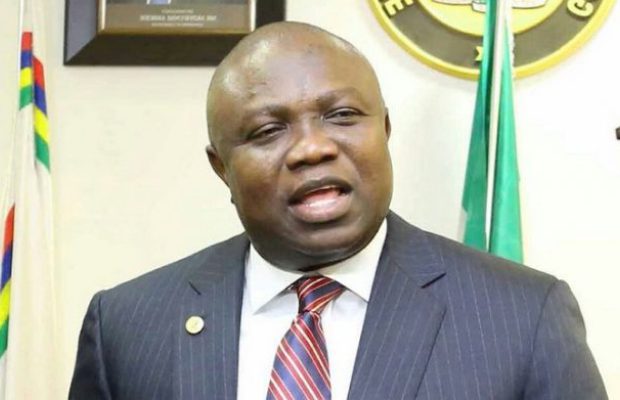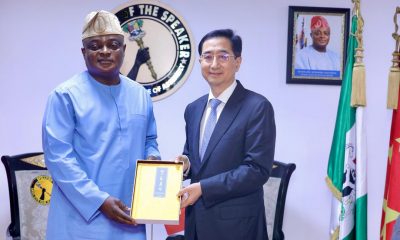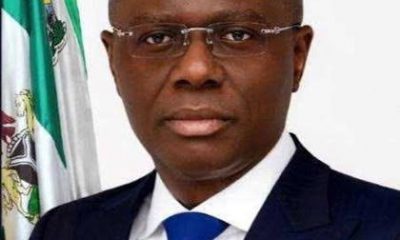society
WE’RE BUILDING ENDURING INFRASTRUCTURE TO DRIVE TOURISM -AMBODE …Says Sector Contributed N800bn To Lagos GDP In 2017 …Lagos Can Truly Become Hub For Tourism In Africa- Mahama

Lagos State Governor, Mr. Akinwunmi Ambode on Monday said his administration was consciously investing huge resources to develop an enduring infrastructural architecture that would ensure that the State’s tourism potentials are fully harnessed for all round economic growth and development.
The Governor, who spoke at the Lagos Tourism Summit, held at the Eko Hotels and Suites, Victoria Island, with the theme- ‘Destination Lagos: Towards A Sustainable Tourism-Driven Economy’, said the plans, concepts and executions of his administration are deliberate and well thought-out to make the highly populated mega city-state culturally attractive and artistically functional.
“As a government, we are conscious of the fact that infrastructure, security, stability and partnership with all stakeholders are fundamental ingredients for tourism development. We have channeled a lot of resources into creating an enduring infrastructural architecture for the business of tourism to thrive,” he said.
He said his administration was not unmindful of the fact that for the State to match up with other leading world tourism destinations like Miami; São Paulo; Dubai, Singapore and Tokyo as well as African cities such as Cape Town, Cairo, Marrakech and Accra, the right infrastructure has to be put in place.
“In order to do this successfully, we must first build a solid infrastructural architecture that will endure. It must be safe and secure; it must provide functional and diverse venues for the arts, culture, festivals, creative industry, recreation and wildlife; and it must constantly and productively engage with its critical stakeholders.
“So when you see us reclaim 50 hectares of land at the Oworonshoki end of our lagoon; when you see us clear a whole stretch at the Badagry and Epe Marina; when we insist that our prime waterfront must not be taken over by shanties and slums; when you see us embark on some ambitious road, fly-over and modern bus terminal constructions; we are preparing the grounds for a major source of employment and prosperity.
“When you see us continue to plead for the control of wasting federal assets like the National Arts Theatre, National Museum and National Stadium and possibly declare our intention to have the Muritala Mohammed International Airport concessioned to us; we are focused on our tourism sector.
“When you see our unwavering commitment in changing the face of public transportation, committing more funds to providing jetties and expanding access to waterways, please know that we are driven only by the need to build and sustain the needed infrastructure upon which an enduring tourism landscape can stand and outlive our administration and those coming after us,” the Governor said.
Alluding to the massive opportunities available in the sector, Governor Ambode said that the activities within the tourism sector contributed about N800billion to the State’s Gross Domestic Product (GDP) in 2017.
“The tourism sector contributed about $2.2billion (N800billion) to the Lagos GDP in 2017 and with the infrastructure and resources we are deploying in this sector, we expect this figure to double or treble in the next 5 years.
“The enormous resources we have deployed in physical and social infrastructure across the State will begin to crystallize by December into mega structures that will support tourism and market our state as a smart destination,” the Governor said.
Noting that Nigeria boasts of very rich culture and heritage, Governor Ambode said it was not in doubt that the country has the largest concentration of the black race, adding that Lagos sits in a better position to tell the story of the black race.
He said the Lagos Tourism Master plan, which would emerge at the end of the summit was premised in the context of the fact that the State can become an iconic brand of the black race.
“The Tourism Master Plan is focused on Six (6) key sectors; Culture and Heritage, Film, Art and Entertainment, Business Tourism, Nature and Adventure, Medical and Wellness, Beach and Leisure,” Governor Ambode said.
Besides, he said the Tourism Summit, coming a week after a Security Summit was held at the same venue was a demonstration of the government’s commitment to find alternative platforms that can enrich and propel the State to prosperity continuously.
In his keynote address, former President of Ghana, Mr. John Dramani Mahama said that Lagos has the potentials to emerge as a foremost destination for tourism development in Africa.
While commending Governor Ambode for his efforts towards growing tourism through investment in infrastructure, he said with the billions of dollars revolving in the sector across the world and over 1.8billion tourists, the State was heading in the right direction in its bid to become Africa’s tourism hub.
“I’ve been following the progress Lagos has made on various fronts and I join those who have celebrated Governor Akinwunmi Ambode for the contributions he has made within this short period to enhance the efforts and contributions of his predecessors.
“There are potential billions of naira in revenue that Lagos State could earn in the next several years with the successful implementation of the plan that you intend could come out of this summit.
“If you look at the nearly $7trillion that is supposed to be earned from tourism, then definitely Lagos State positioning itself as a favourite destination for tourism in order to get a share of this huge cake is a very wise decision by Governor Ambode and his team.
“Thankfully, Lagos in preparation for the launch of the State’s tourism master plan has began upgrading and expanding critical infrastructure including transportation, roads and of course the recent reclamation that is ongoing,” Mahama said.
Several paper presentations by speakers at the Summit including Minister of Information and Culture, Alhaji Lai Mohammed, Professor Pat Utomi, Mr. Desmond Majekodunmi, Mrs Omotayo Omotosho, Mr. Philip Hughes, while commending the State Government for putting together the summit, made recommendations on what Lagos must do to harness the massive potentials in the tourism sector.
society
Ramadan: Adron Homes Felicitates Muslims, Preaches Hope and Unity

Ramadan: Adron Homes Felicitates Muslims, Preaches Hope and Unity
Adron Homes & Properties Limited has congratulated Muslim faithful on the commencement of the holy month of Ramadan, urging Nigerians to embrace the virtues of sacrifice, discipline, and compassion that define the season.
In a statement made available to journalists, the company described Ramadan as a period of deep reflection, spiritual renewal, and strengthened devotion to faith and humanity.
According to the management, the holy month represents values that align with the organisation’s commitment to integrity, resilience, and community development.
“Ramadan is a time that teaches patience, generosity, and selflessness. As our Muslim customers and partners begin the fast, we pray that their sacrifices are accepted and that the season brings peace, joy, and renewed hope to their homes and the nation at large,” the statement read.
The firm reaffirmed its dedication to providing affordable and accessible housing solutions to Nigerians, noting that building homes goes beyond structures to creating environments where families can thrive.
Adron Homes further urged citizens to use the period to pray for national unity, economic stability, and sustainable growth.
It wished all Muslim faithful a spiritually fulfilling Ramadan.
Ramadan Mubarak.
society
Underfunding National Security: Envelope Budgeting Fails Nigeria’s Defence By George Omagbemi Sylvester

Underfunding National Security: Envelope Budgeting Fails Nigeria’s Defence
By George Omagbemi Sylvester | Published by saharaweeklyng.com
“Fiscal Rigidity in a Time of Crisis: Lawmakers Say Fixed Budget Ceilings Are Crippling Nigeria’s Fight Against Insurgency, Banditry, and Organized Crime.”
Nigeria’s legislature has issued a stark warning: the envelope budgeting system; a fiscal model that caps spending for ministries, departments, and agencies (MDAs) is inadequate to meet the country’s escalating security challenges. Lawmakers and budget analysts argue that rigid fiscal ceilings are undermining the nation’s ability to confront insurgency, banditry, kidnapping, separatist violence, oil theft and maritime insecurity.
The warning emerged during the 2026 budget defence session for the Office of the National Security Adviser (ONSA) at the National Assembly in Abuja. Senator Yahaya Abdullahi (APC‑Kebbi North), chairman of the Senate Committee on National Security and Intelligence, decried the envelope system, noting that security agencies “have been subject to the vagaries of the envelope system rather than to genuine needs and requirements.” The committee highlighted non-release or partial release of capital funds from previous budgets, which has hindered procurement, intelligence and operational capacity.
Nigeria faces a multi‑front security crisis: persistent insurgency in the North‑East, banditry and kidnappings across the North‑West and North‑Central, separatist tensions in the South‑East, and piracy affecting Niger Delta oil production. Despite declarations of a national security emergency by President Bola Tinubu, lawmakers point to a “disconnect” between rhetoric and the actual fiscal support for agencies tasked with enforcement.
Experts warn that security operations demand flexibility and rapid resource allocation. Dr. Amina Bello, a public finance specialist, said: “A static budget in a dynamic threat environment is like sending firefighters with water jugs to a forest fire. You need flexibility, not fixed ceilings, to adapt to unforeseen developments.”
The Permanent Secretary of Special Services at ONSA, Mohammed Sanusi, detailed operational consequences: irregular overhead releases, unfulfilled capital appropriations, and constrained foreign service funds. These fiscal constraints have weakened intelligence and covert units, hampering surveillance, cyber‑security, counter‑terrorism and intelligence sharing.
Delayed capital releases have stalled critical projects, including infrastructure upgrades and surveillance systems. Professor Kolawole Adeyemi, a governance expert, emphasized that “budgeting for security must allow for rapid reallocation in response to threats that move faster than political cycles. Envelope budgeting lacks this essential flexibility.”
While the National Assembly advocates fiscal discipline, lawmakers stress that security funding requires strategic responsiveness. Speaker Abbas Ibrahim underscored that security deserves “prominent and sustained attention” in the 2026 budget, balancing oversight with operational needs.
In response, the Senate committee plans to pursue reforms, including collaboration with the executive to restructure funding, explore supplementary budgets and ensure predictable and sufficient resources for security agencies. Experts warn that without reform, criminal networks will exploit these gaps, eroding public trust.
As one policy analyst summarized: “A nation declares a security emergency; but if its budget does not follow with real resources and oversight, the emergency remains rhetorical.” Nigeria’s debate over envelope budgeting is more than an accounting dispute; it is a contest over the nation’s security priorities and its commitment to safeguarding citizens.
society
Rev. Mother Kehinde Osoba (Eritosin) Celebrates as She Marks Her Birthday

Rev. Mother Kehinde Osoba (Eritosin) Celebrates as She Marks Her Birthday
Today, the world and the body of Christ rise in celebration of a rare vessel of honour, Rev. Mother Kehinde Osoba, fondly known as Eritosin, as she marks her birthday.
Born a special child with a divine mark of grace, Rev. Mother Eritosin’s journey in God’s vineyard spans several decades of steadfast service, spiritual depth, and undeniable impact. Those who know her closely describe her as a prophetess with a heart of gold — a woman whose calling is not worn as a title, but lived daily through compassion, discipline, humility, and unwavering faith.
From her early days in ministry, she has touched lives across communities, offering spiritual guidance, prophetic insight, and motherly counsel. Many testify that through her prayers and teachings, they encountered God in a deeply personal and transformative way. Near and far, her influence continues to echo — not only within church walls, but in homes, families, and destinies reshaped through her mentorship.
A mother in every sense of the word, Rev. Mother Kehinde Osoba embodies nurture and correction in equal measure. As a grandmother, she remains energetic in purpose — accommodating the wayward, embracing the rejected, and holding firmly to the belief that no soul is beyond redemption. Her life’s mission has remained consistent: to lead many to Christ and guide them into the light of a new beginning.
Deeply rooted within the C&S Unification, she stands tall as a spiritual pillar in the Cherubim and Seraphim Church globally. Her dedication to holiness, unity, and prophetic service has earned her widespread respect as a spiritual matriarch whose voice carries both authority and humility.
As she celebrates another year today, tributes continue to pour in from spiritual sons and daughters, church leaders, and admirers who see in her a living reflection of grace in action.
Prayer for Rev. Mother Kehinde Osoba (Eritosin)
May the Almighty God, who called you from birth and anointed you for His service, continually strengthen you with divine health and renewed vigour.
May your oil never run dry, and may your prophetic mantle grow heavier with greater glory.
May the lives you have nurtured rise to call you blessed.
May your latter years be greater than the former, filled with peace, honour, and the visible rewards of your labour in God’s vineyard.
May heaven continually back your prayers, and may your light shine brighter across nations.
Happy Birthday to a true Mother in Israel — Rev. Mother Kehinde Osoba (Eritosin).
More years.
More anointing.
More impact.
If you want this adapted for a newspaper page, church bulletin, Facebook post, or birthday flyer, just tell me the format and tone.
-

 celebrity radar - gossips6 months ago
celebrity radar - gossips6 months agoWhy Babangida’s Hilltop Home Became Nigeria’s Political “Mecca”
-

 society6 months ago
society6 months agoPower is a Loan, Not a Possession: The Sacred Duty of Planting People
-

 society5 months ago
society5 months agoReligion: Africa’s Oldest Weapon of Enslavement and the Forgotten Truth
-

 news6 months ago
news6 months agoTHE APPOINTMENT OF WASIU AYINDE BY THE FEDERAL GOVERNMENT AS AN AMBASSADOR SOUNDS EMBARRASSING












You must be logged in to post a comment Login